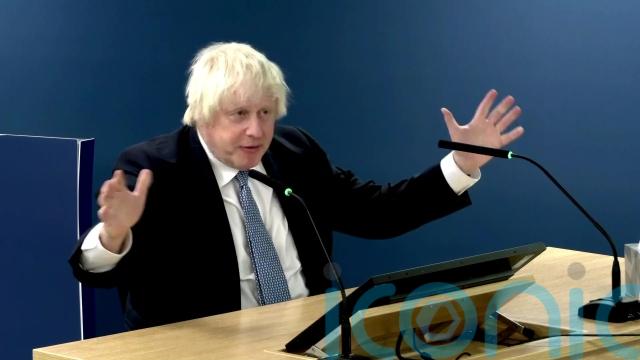
Boris Johnson has denied there was a failure to plan for Covid school closures at the start of the pandemic, saying it would be “surprising” if there had been no planning.
The former prime minister told the UK Covid-19 Inquiry on Tuesday that it was “obvious” there would need to be “consideration of closing schools” and “it looked to me as though the DfE (Department for Education) was preparing for that”.
Last week, former education secretary Sir Gavin Williamson told the inquiry he had not asked DfE officials to prepare an assessment on the impact of school closures in early 2020, as the advice at the time “was not recommending closures” and Number 10 had not commissioned it.
In his written evidence, Sir Gavin described a “discombobulating 24-hour sea-change” from keeping schools open on March 16 to talking about closing them on March 17, and an announcement to shut them made the following day.
On Tuesday, Mr Johnson insisted work had been done to plan for school closures, saying: “If you look at the sequence from February onwards, it’s clear that Sage (the Scientific Advisory Group for Emergencies) is talking about the possibility, the Cabinet is discussing it in March.
“Certainly I remember the subject coming up repeatedly.”
Mr Johnson added he had received a note from the DfE on March 15 asking for a meeting on the subject “in which they go over all kinds of stuff that are going to be necessary to enact school closures”, including safeguarding, exams and teacher training.
He added he would not have expected the DfE to wait for an instruction from Number 10 before planning for closures and he was “surprised that the permanent secretary at the DfE didn’t feel that it was necessary to look at what contingency arrangements we had”.
He said: “I just think that it was obvious that there had to be consideration of closing schools.
“I was very much hoping that we wouldn’t have to close schools. I thought it was a nightmare idea.”
Asked if he accepts that until March 2020 there had not been a cross-government focus on schools, Mr Johnson said: “No, I don’t really accept that.”

He added: “I think there had already been conversations about the possibility of closing schools. And it looked to me as though the DfE was preparing for that.”
The former prime minister also denied there had been a “dereliction of duty” in failing to plan for school closures during the pandemic, but said officials had been “overwhelmed by the speed of events”.
Sir Jon Coles, the former director-general for schools at the DfE, previously told the UK Covid-19 Inquiry it was an “extraordinary dereliction of duty” for the DfE not to plan for school closures earlier in March 2020.
Later on in the inquiry, Mr Johnson said school closures should be “a measure of last resort” in tackling any future events like the Covid-19 pandemic.
“I think that looking back on it all, the whole lockdowns, the intricacy of the rules, the rule of six, the complexity, particularly for children, I think we probably did go too far and it was far too elaborate,” Mr Johnson said.
“Maybe we could have found a way of exempting children.”
Protesters for charity Long Covid Kids outside Dorland House where the hearings are being held shouted “shame on you” as Mr Johnson left the building.
Dan Paskins, executive director of UK Impact at Save the Children UK, said the actions of those in power during the pandemic “damaged a generation of children” and “no amount of regret will undo the harm that has been done”.
He added: “There was no clear mechanism to protect (children’s) interests, and no voice for them in the room. Decisions were rushed, impact assessments neglected, and their needs assumed to mirror adults’. This must never be allowed to happen again.”
Asked by inquiry counsel Clair Dobbin KC whether he recognised what happened with exams in the summer of 2020 was “really damaging” to children doing their GCSEs and A-levels, Mr Johnson said he regretted that they did not get the model right initially.
The former prime minister added: “Was Covid a disaster? Yes. Was the loss of education a disaster? Yes. Was the loss of exams a disaster? Yes.
“Was the disappointment, anger, the additional frustration of a large number of kids a disaster? Yes, it was, but it has to be seen in the context of us trying to deal with a much, much bigger disaster and that was the loss of learning and the loss of the exams themselves.”
A Government spokesperson said: “We know there will be lessons to be learnt from the pandemic and we are committed to learning from the Covid Inquiry’s findings, which will play a key role in informing the Government’s planning and preparations for the future.”
The inquiry continues.
Subscribe or register today to discover more from DonegalLive.ie
Buy the e-paper of the Donegal Democrat, Donegal People's Press, Donegal Post and Inish Times here for instant access to Donegal's premier news titles.
Keep up with the latest news from Donegal with our daily newsletter featuring the most important stories of the day delivered to your inbox every evening at 5pm.